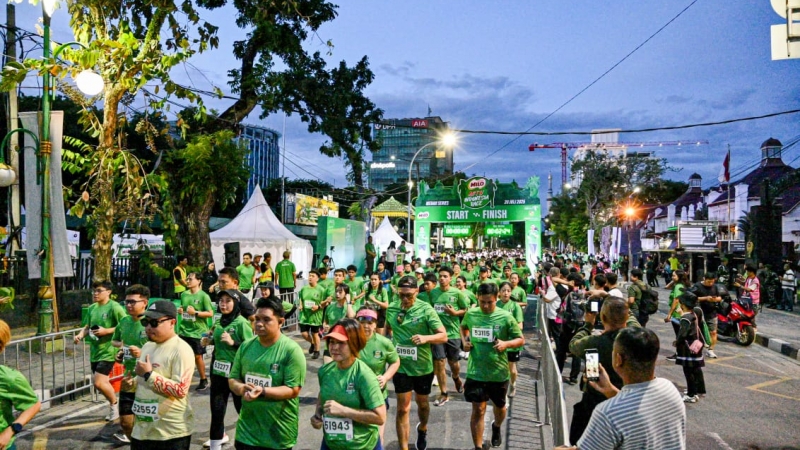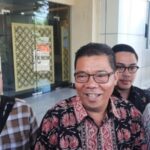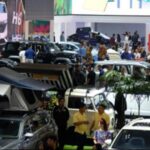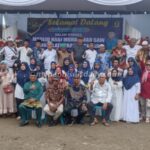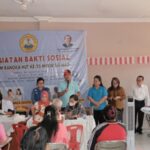Following successful events in Makassar, Surabaya, and Bandung, the Road to MILO ACTIV Indonesia Race 2025 has now arrived in Medan as the fourth city. The event took place at Benteng Medan Field and attracted 4,200 participants across two categories: the 5K and the Family Run 2.5K.
The participants were officially sent off by representatives from the local government and sports authorities.
A spokesperson from Nestlé MILO stated that after the success of the 2024 edition, which was held in 13 cities with over 57,000 runners, the company has launched the MILO ACTIV Indonesia Race 2025, starting in March 2025.
“Nestlé MILO is delighted to return to Medan, a city that has consistently shown tremendous enthusiasm for promoting a healthy and active lifestyle. This year, the number of participants has increased compared to previous years, with around 4,200 Medan residents joining the Road to MILO ACTIV Indonesia Race 2025 Medan Series,” the spokesperson said.
They added that Nestlé MILO provided various activities for participants in the race village, including chilled MILO drinks, personalized medal engraving, photo zones, entertainment, and a Kids Corner for children, along with exciting door prizes.
Through this program, Nestlé MILO proudly supports the Indonesian government’s efforts to foster a healthier and more active society.
The MILO ACTIV Indonesia Race contributes to the holistic development of Indonesian children, helping them reach their full potential. Since 2010, Nestlé MILO’s running programs have encouraged over 366,000 Indonesians, starting from an early age, to adopt a healthy and active lifestyle.
The Medan City Government expressed appreciation for the Road to MILO ACTIV Indonesia Race 2025 Medan Series.
“We fully support Nestlé MILO’s initiative to promote a healthy and active lifestyle among the community. Events like this align with our commitment to building a healthier and more productive younger generation, encouraging children to embrace sports from an early age alongside their families,” said a representative from the Medan Youth and Sports Office.
In the 5K Men’s category, Daniel Simanjuntak secured first place with a time of 15 minutes and 07 seconds, while Cilpia Manalu won the 5K Women’s category with a time of 19 minutes and 13 seconds.
“This was my first time participating in the Road to MILO ACTIV Indonesia Race after missing last year’s event. I prepared thoroughly to achieve my goal of reaching the podium. With a well-planned route and favorable weather, I managed to finish within my expected time,” said Cilpia Manalu.
Benteng Medan Field
Benteng Medan Merdeka (Medan Merdeka Field) is a large historic square located in the center of Jakarta, Indonesia. Originally a Dutch colonial parade ground called *Koningsplein* (King’s Square), it was renamed after Indonesia’s independence and now surrounds the National Monument (Monas), a symbol of the country’s freedom. The site serves as a significant public space for national celebrations and gatherings.
Makassar
Makassar (also known as Ujung Pandang) is a bustling port city on the southwestern coast of Sulawesi, Indonesia, with a rich history as a trading hub dating back to the 16th century. It was a key center of the Gowa-Tallo Sultanate and later became a major Dutch colonial stronghold. Today, it is known for its vibrant culture, historic Fort Rotterdam, and as the gateway to eastern Indonesia.
Surabaya
Surabaya, Indonesia’s second-largest city, is a major port and industrial hub on Java Island with a rich history dating back to the 14th century. It played a pivotal role in Indonesia’s struggle for independence, notably during the 1945 Battle of Surabaya against Dutch forces, now commemorated as Heroes’ Day. Today, it blends modern development with cultural landmarks like the Suramadu Bridge and historic sites such as the House of Sampoerna.
Bandung
Bandung is the capital of West Java, Indonesia, known for its cool climate, colonial architecture, and vibrant arts and culinary scene. Established by the Dutch in the early 19th century, it became a popular retreat during colonial times and later played a key role in Indonesia’s independence movement, hosting the 1955 Asia-Africa Conference. Today, Bandung is a bustling city famous for its creative industries, universities, and scenic surroundings like the Tangkuban Perahu volcano.
Medan
Medan is the capital city of North Sumatra, Indonesia, and a vibrant cultural and economic hub. Founded in the 16th century, it grew significantly during the Dutch colonial era as a center for tobacco and rubber plantations. Today, Medan is known for its diverse cultural heritage, including Malay, Chinese, and Indian influences, as well as landmarks like the Maimun Palace and the Great Mosque of Medan.
Nestlé MILO
Nestlé MILO is a popular chocolate malt powder drink developed by Australian chemist Thomas Mayne in 1934 and later produced by Nestlé. Originally created as a nutritious supplement for children during the Great Depression, MILO is known for its energy-boosting formula and is now sold in over 40 countries, particularly in Asia, Africa, and Australia. The brand has become a cultural icon, often associated with sports and active lifestyles.
MILO ACTIV Indonesia Race
The **MILO ACTIV Indonesia Race** is an annual sports and fitness event organized by Nestlé’s MILO brand, aimed at promoting an active lifestyle among children and families in Indonesia. Typically featuring obstacle courses, running races, and other physical challenges, the event encourages teamwork, perseverance, and healthy competition. Inspired by MILO’s long-standing association with sports nutrition, the race has become a popular platform for youth engagement in fitness across the country.
Medan Youth and Sports Office
The Medan Youth and Sports Office is a governmental institution in Medan, Indonesia, dedicated to promoting youth development and sports activities in the region. Established to support athletic programs and youth engagement, it plays a key role in organizing local sports events, training, and community initiatives. While specific historical details are limited, it reflects Indonesia’s broader efforts to foster youth potential and sportsmanship.

